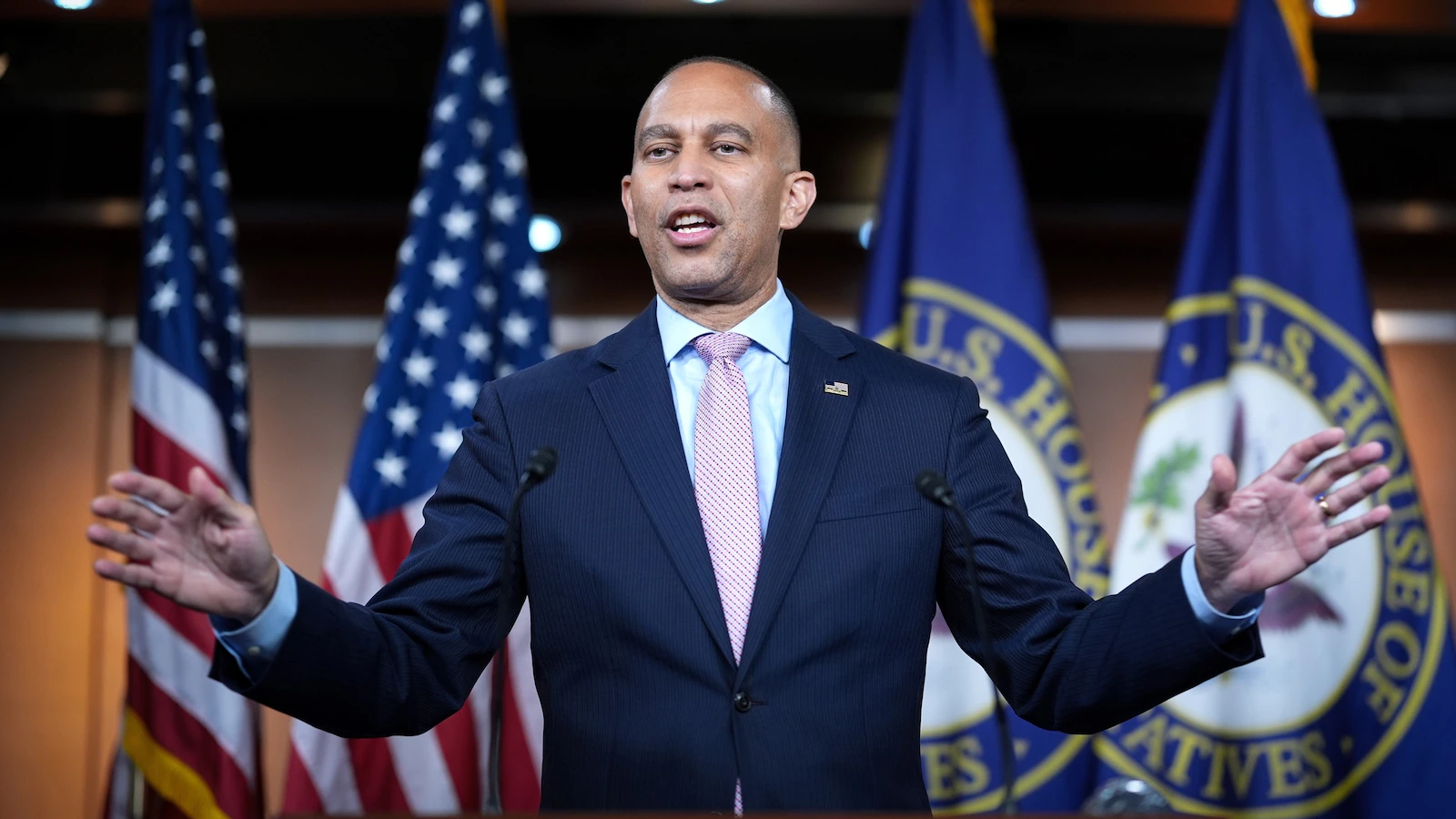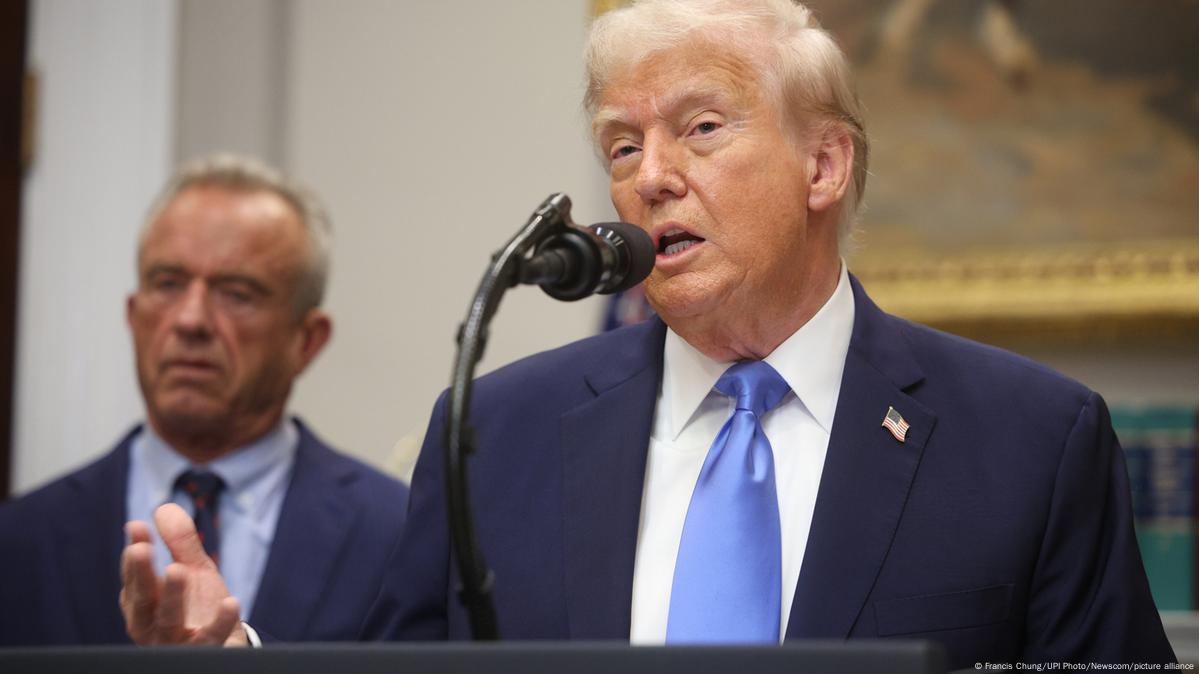
A rush transcript of “This Week with George Stephanopoulos” airing on Sunday, September 28, 2025 on ABC News is below. This copy may not be in its final form, may be updated and may contain minor transcription errors. For previous show transcripts, visit the “This Week” transcript archive.
MARTHA RADDATZ, ABC “THIS WEEK” CO-ANCHOR: Our thanks to Rachel.
I’m joined now in studio by House Minority Leader Hakeem Jeffries.
Good to see you, Leader Jeffries.
We have learned this morning that you will be meeting with Donald Trump on Monday with Mike Johnson, Leader Schumer, Leader Thune.
How did that meeting come about?
REP. HAKEEM JEFFRIES (D-NY), HOUSE MINORITY LEADER: Well, Leader Schumer and I initially requested a meeting last Saturday. Donald Trump agreed to the meeting and then a few days later abruptly cancelled it.
We’ve made clear that we’re ready, willing, and able to sit down with anyone at any time and at any place in order to make sure that we can actually fund the government, avoid a painful Republican caused shutdown, and address the healthcare crisis that Republicans have caused that’s impacting everyday Americans all across the country.
RADDATZ: So, did the White House call you, all of you, or did you keep asking for a meeting? Did they explain why it was canceled before?
JEFFRIES: They did not explain why it was canceled other than the statement that Donald Trump issued that mischaracterized Democratic position.
Our position has been very clear — cancel the cuts, lower the cost, save health care — so we can address the issues that really matter to the American people in an environment where the cost of living is too high, where the quality of life of everyday Americans has been undermined consistently since January 20th.
Speaker Mike Johnson reached out to me yesterday, indicated that there had been a conversation between Republican leaders and the president, and as a result, the meeting is back on.
RADDATZ: I know you haven’t had any formal meetings with President Trump. You were around him during inauguration and obviously met him. What are your expectations from this meeting? And can you compromise?
JEFFRIES: Well, Donald Trump has taken a go it alone approach from the very beginning of this Congress. And unfortunately, my colleagues on the Republican side of the aisle have behaved not as a separate and co-equal branch of government and a check and balance on an out-of-control executive branch, but as a consistent rubber stamp for Donald Trump’s extreme agenda.
Our view going into the meeting is that we want to find bipartisan common ground to find a spending agreement that avoids a government shutdown and actually meets the needs of the American people in terms of their health, their safety. and their economic wellbeing.
RADDATZ: If I had to mark this day, do you believe that there will be a government shutdown? They need Democratic votes.
JEFFRIES: Well, it’s my hope that we’ll avoid one. At the end of the day, Republicans do control the House, the Senate, and the presidency. And what we’ve seen consistently, including with the —
RADDATZ: But they need Democratic votes.
JEFFRIES: Well, certainly any enlightened agreement at the end of the day, any sustainable agreement should always be bipartisan in nature, and that’s been our position.
It’s also been our position, quite clearly, that we’ve got to address this Republican healthcare crisis.
Think about this. The largest cut to Medicaid in American history, a potential $536 billion cut to Medicare if Congress doesn’t act by the end of the year. And if we don’t extend the Affordable Care Act tax credits, more than 20 million Americans are going to experience dramatically increased premiums, co-pays, and deductibles in an environment where the cost of living in America is already too high.
RADDATZ: You just said they don’t expire until the end of the year. We know they don’t expire until the end of the year. So why not approve this and just get seven more weeks to negotiate?
JEFFRIES: Well, because notices are going to go out in a matter of days, and it’s going to be a shock to the system of everyday Americans who are already struggling to get by. Life is already too expensive. People are already living paycheck to paycheck, and we’re talking about —
RADDATZ: So, today, you could say, you know, let’s compromise and those notices wouldn’t go out, right?
JEFFRIES: Well, we actually need to enact legislation to ensure that the Affordable Care Act tax credits are extended.
And the challenge that we have in this particular instance is that several times over the last few months, Republicans in the House have had the opportunity to vote with Democrats to extend the Affordable Care Act tax credits. And they’ve repeatedly and consistently declined to do it. They voted no over and over and over again.
And we know that Republicans have basically relentlessly attacked the health care of the American people, not simply this year in the context of the one big ugly bill, and hospitals and nursing homes and community-based health clinics all across the country, including in rural America are shutting down. But they’ve been after the Affordable Care Act since 2010.
They are obsessed with cancelling the healthcare of the American people. We actually are working to save the healthcare of the American people.
RADDATZ: Let me — let me talk about the American people.
JEFFRIES: Yeah.
RADDATZ: I want to play what — play what you were saying back in December after then President-elect Trump came out against the bill Congress was working to pass to keep the government open. This is what you said would be the result of a shutdown.
(BEGIN VIDEO CLIP)
JEFFRIES: Families will be hurt. Farmers will be hurt. Border security and border patrol agents will not be paid. TSA agents will not be paid.
Small businesses will be hurt in every single community.
(END VIDEO CLIP)
RADDATZ: And this time, the threat of mass firings basically and telling people they may not be able to come back to work at all.
So, do you still believe a shutdown would broadly hurt the American people?
JEFFRIES: We are always of the view that we need to fund the government and make sure that the services that the American people rely upon can continue to be received and also that we stand by our federal civil servants.
We’ve seen since January 20th, mass firings already taking place by the Trump administration, in the absence of government shutdown because this is what they’ve determined to do, hurt everyday Americans.
We consistently have made the point, we want to find a bipartisan path forward and reach a spending agreement with our Republican colleagues that actually meets the needs of the American people, but that also addresses the Republican health care crisis that is harming everyday Americans all across the country — rural America, urban America, the heartland of America, suburban America, small town America, and Black and brown communities throughout America.
RADDATZ: If there is a shutdown, then what do you do? We have about 30 seconds left here.
JEFFRIES: Well, we’ve seen during the Trump administration, the first time around, a 35-day government shutdown. That was way too long. Ultimately, Donald Trump and Republicans came to their senses.
Hopefully, we avoid a shutdown this time around. And if we’re in one, we find a quick path out.
RADDATZ: Are you more optimistic this morning?
JEFFRIES: I’m hopeful.
RADDATZ: Okay. Thanks very much for joining us, Leader Jeffries.
JEFFRIES: Thank you.
RADDATZ: And let’s bring in House Majority Leader Steve Scalise.
Good morning, Leader Scalise.
You heard Leader Jeffries there. The Democrats sound dug in. Do you think President Trump can make a big difference?
HOUSE MAJORITY LEADER REP. STEVE SCALISE, (R) LOUISIANA: He can, Martha. And thanks for having me.
You know, President Trump’s been trying to get a deal. You know, we passed a bill through the House to keep the government from shutting down. Hakeem actually whipped his members to shut the government down. He voted that way. But luckily, we were able to get the bill passed. So, right now it’s over in the Senate, and it’s on Chuck Schumer and Democrats in the Senate to keep the government from shutting down, and I hope they’ll come to their senses and do that early next week.
RADDATZ: But — but you need those Democratic votes for sure. So, how do you bring them towards your side, or compromise?
SCALISE: Well, nobody needs to move to any side. Just keep in mind, Martha, if you go back to March, this is the same set of funding levels that Democrats voted for in March that — that is contained in this CR. So, there is no new changes to what we’re trying to do to keep negotiations going. We still need to have negotiations. There is a conference committee on many of the appropriations bills right now. Tom Cole, and his appropriators, have gotten agreements on most parts of government funding. And it’s been the Democrat leadership that’s held them off. Ultimately, let’s let those talks continue till November with this short-term government funding bill that’s in the Senate. But it’s the same levels of funding that the Senate voted for, Democrats included, back in March.
RADDATZ: And the administration has threatened these mass firings of federal employees. What would that look like? And is that something you — you support?
SCALISE: Well, I haven’t seen the full details. But if you go back to Covid, Martha, President Biden dramatically expanded, mushroomed the size of the federal government, supposedly to deal with Covid. Well, Covid is over, and yet many of those federal agencies are still 20 or 30 percent larger than they were before Covid. And so there’s been a need for a rightsizing of the federal government for a long time. President Trump’s talked about that with DOGE and other things he’s doing to try to save waste, fraud and abuse in government. And I think everybody knows there are billions, and tens of billions of dollars in waste, fraud and abuse that still needs to be rooted out. We got to some of that, but there’s more that needs to be done.
RADDATZ: Is — is that the way to do it? Whether you pair down the federal government or not, is that the way to do it, a government shutdown, you just start mass firings?
SCALISE: Well, obviously, there’s lots of ways to do it. It would be nice if there was a bipartisan agreement to cut out waste, fraud, and abuse in government. But every Democrat voted no, voted against things like taxpayer funding for illegals to get government benefits. Every Democrat voted against rooting that out. Giving checks, government checks to dead people. It’s been going on for a long time. We finally put verifications in place. Every Democrat voted against that. So, so far they’ve shown they don’t want to root out waste, fraud and abuse.
President Trump ran on doing it. He was elected with a mandate by the American people to finally bring fiscal sanity so we can reduce deficits, get spending under control, get the economy back on track. And that’s what we’ve been laser focused on.
RADDATZ: You — you heard Leader Jeffries say he was hopeful there would not be a government shutdown. Would you say you’re hopeful? And, if so, why?
SCALISE: I’m not only hopeful. I, Speaker Johnson, all of my Republican colleagues voted to prevent a government shutdown, and we passed that bill to the Senate. That bill’s still sitting over in the Senate.
You saw a vote a few days ago where almost every Republican, and only one Democrat, voted for it. There’s still time for an agreement to be reached. I’m glad that President Trump is showing leadership in meeting with all leaders, Republican and Democrat, Monday in the White House. But ultimately, those Democrats have to make a decision, do they want to shut down the government to appease their radical base, who’s been just looking for a fight for Donald Trump for no reason other than they’re not happy with the results of the election last year, or are they going to work with the president to keep negotiations going. This — again, this is a short-term funding bill that goes till November 21st, allows for government, you know, troops to be paid. All of the other things that Hakeem, everybody says they don’t want, yet they voted to shut the government down. Let’s have the Senate go do the right thing and pass that bill that’s sitting over there waiting.
RADDATZ: And — and, quickly, if you could, Leader Scalise, I want — I want to talk about the Comey indictment.
Let me read you what your fellow Republican caucus member, Representative Don Bacon, wrote in response to the indictment, “lawfare undermines our great country. It didn’t start in January, but it didn’t end either. The continued escalation will only hurt us all.”
Your response to that?
SCALISE: Well, we saw an unbelievable abuse of power from federal agencies for years and years. And, frankly, James Comey is one of the main culprits in undermining the public’s trust in agencies like the FBI. He abused his power, Martha. And now, ultimately, he has been indicted for lying to Congress. This isn’t about what he did to the president, it’s about lying to Congress and obstructing justice. And that’s what he was indicted for. He’s going to ultimately go before a jury of his peers. So, he gets to make his case.
But there’s serious charges. And it’s — it’s not the only thing that he’s done that he’s been accused of in the past. I mean, he was behind the Russian hoax that undermined public confidence in these agencies. He’s accused of being a dirty cop. And that’s a — it’s not a good place for somebody to be. And — and he’s disgraced the agency.
RADDATZ: We will see what happens in court.
Thank you so much for joining us this morning, Leader Scalise.
Coming up, the president’s message to world leaders at the U.N., and the fallout from the latest targeted shooting. The roundtable weighs in when we come back.
(COMMERCIAL BREAK)



